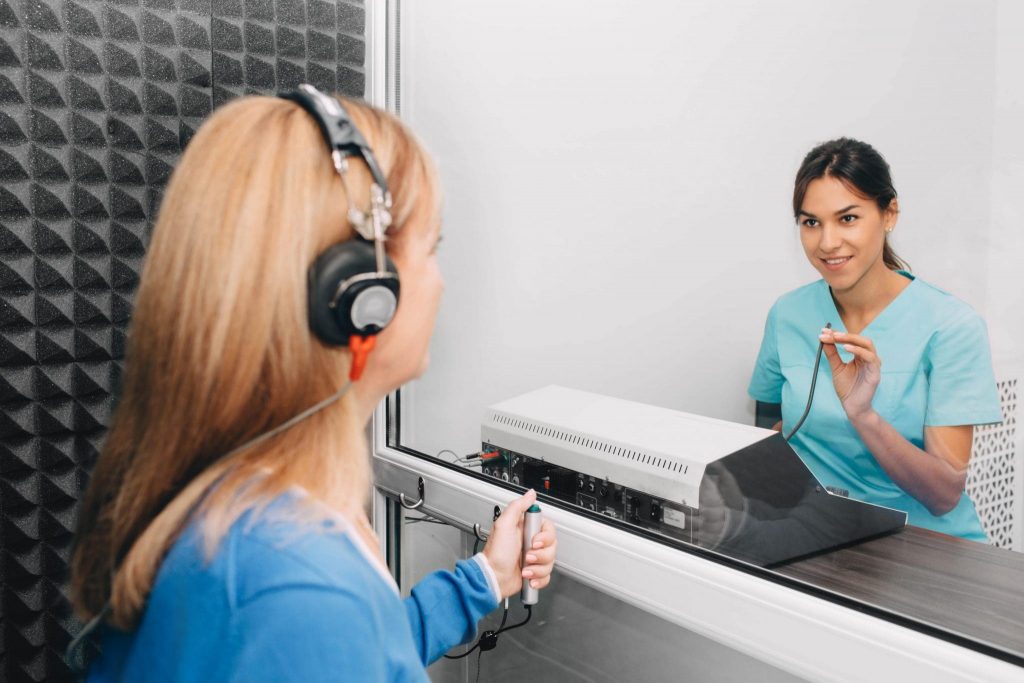About your audiology course
Building on the success of our popular Foundation Degree in Hearing Aid Audiology, this Academy for Healthcare Science (AHCS) accredited Bachelor top-up course allows you to convert your Foundation Degree qualification (or equivalent) to a full BSc (Hons) degree in Audiology.
Our audiology degree programme is ideal if you're a practicing or aspiring Audiologist in the private or independent sectors, or the NHS. While the majority of your study will be undertaken online to give you the flexibility to advance your career around your other commitments, you will attend residentials that will allow you to get the most from learning in a collaborative environment.
Course highlights
- Designed specifically for those working as Hearing Aid Dispensers and Audiologists
- Access to the latest hardware, devices, and innovations from leading manufacturers
- Gain professional accreditation with the Academy for Healthcare Science (AHCS)
How you'll study
Online with campus residentials
Course length
Study over 1 year
2 year option subject to availability
30th April 2024
Fees: £9,250
Professional accreditation
Accredited by the Academy for Healthcare Science (AHCS)
UK Quality Assured
Course overview
When you complete our Audiology degree you’ll broaden your knowledge of the theoretical and practical aspects of audiology – both rehabilitative and diagnostic – as well as giving you the opportunity to undertake further research into a topic that interests you with the final undergraduate project.
Our residential days will allow you extensive access to the latest hardware from Siemens, GN Resound and Interacoustics, so that you can gain practical experience with a variety of devices. The residential will also give you the opportunity to share your learning journey and experiences with your tutors and peers and to expand your network in a collaborative environment. Our friendly, experienced, and highly motivated academic team are assisted by external experts who are invited to guest speak.
This online audiology course is suitable for practicing Hearing Aid Audiologists with relevant professional body registration such as the Registered Hearing Aid Dispenser with Health and Care Professions Council. If you don’t have the relevant professional body registration you might be interested in our BSc Hons Hearing Sciences (Top-up) course.
When you successfully pass all the required modules on the BSc (Hons) Audiology Top-up you can expect to register with the AHCS.
Our advisers will be happy to answer any questions you have about the audiology top-up degree, studying online or any other aspect of distance learning.
Modules
Due to the structure of this course, there will be instances where you will study two modules simultaneously during a trimester. You will be supported by your tutors to help manage your workload and assessment deadlines.
Please contact one of our advisers to discuss the pacing of this course and the options available to match your circumstances.
Tinnitus Assessment and Management
According to the British Tinnitus Association, around 13% of the population live with persistent tinnitus, and in this module you'll gain an understanding of the consequences, assessment, and management of the condition. The module will also educate you in tinnitus management through an emphasis on evidence-based practice.
Managing People with Specialist Needs
In this module you will develop an understanding of the assessment and management of adults with complex and specialist needs. These needs can arise due to the complex nature of hearing disorders and/or comorbid conditions that are common in the elderly. The skills you will learn in Managing People with Specialist Needs are particularly important to independent practitioners in audiology to be able to support the needs of the clinical audiology pathway in the current and future service commissioning.
Implantable Hearing Devices
Amplification devices continue to benefit people with hearing loss. Although they have some limitations, these devices have made considerable improvements to the quality of life for those living with hearing conditions. In recent years implantable devices have become the management option of choice for many people with hearing disorders. These include cochlear implants; auditory brainstem implants; bone anchored hearing aids; and implantable middle ear devices. You'll gain an understanding of the technology, candidacy, day-to-day maintenance of these devices, as well as the advantages and limitations for patients that have them fitted.
Hearing in Children
You’ll discuss the range of hearing disorders common in children and young adults, covering specific topics including development milestones; hearing disorders; assessment and management of hearing disorders; and the role of stakeholders and multidisciplinary teams. This module will also enhance your knowledge of the transition of services from children to adults.
Advances in Adult Audiology
Hearing healthcare as a profession is developing rapidly with significant advancements in the diagnosis and management of people with hearing loss. You’ll gain an overview of both diagnostic and rehabilitative measures involved in managing adults with hearing loss with the aim of providing up to date knowledge reinforcing evidence-based practice and setting you up for your career as an audiologist.
Clinical Competencies in Audiology
You'll undertake supervised learning and training to gain the theoretical knowledge and practical experience in the Clinical Audiology competencies required at assist-level. The Clinical Competencies in Audiology module is required in order to be awarded this degree, however, if you opt not to undertake this module, yet complete the rest of the modules, you will be awarded a BSc (Hons) Hearing Sciences (top-up) award.
Undergraduate Major Project
You'll create a substantial piece of individual research and/or product development work, focused on a topic that interests you, and chosen from a variety of sources including research groups, previous/current work experience, your current employer, or a suggestion from your tutor. While undertaking your research you will identify problems and issues, conduct literature reviews, evaluate information, investigate and adopt suitable development methodologies, and determine solutions. Your major project will also give you the opportunity to develop hardware, software and/or media artefacts as appropriate, process data, critically appraise and present your findings using a variety of media. Regular meetings with your project supervisor will ensure your project is closely monitored and steered in the right direction.
Modules are subject to change and availability.
Assessment
Your progress will be monitored through regular online interaction, including discussion boards, blogs, and assignments. You will be assessed through your submitted assignments, and Undergraduate Major Project, as well as through a practical final exam.
Meet your tutors
Dr Srikanth Chundu
Course leader
Previously a cochlear implant Audiologist at University of Southampton Auditory Implant Service, and a distance learning tutor for the course, Sri joined Anglia Ruskin University on a full-time basis in April 2015. He has worked in various settings in Audiology and is currently involved with a number of research projects in collaboration with other Universities. These projects include research into areas such as Cochlear implant rehabilitation, Internet based rehabilitation, Psycho-social aspects of hearing loss and occupational hearing loss.
Sri is a Doctor of Audiology (Au.D), a Master of Science (M.Sc) in Audiology, a Bachelor of Science (B.Sc) in Speech & Hearing. He is also registered with the Academy for Healthcare Science (AHCS) as Audiologist.
Dr Robert C MacKinnon
Senior Lecturer
Robert's BA (Hons) in Natural Sciences at the University of Cambridge gave him a broad scientific background. He specialised in Neuroscience in his final year and his undergraduate project was performed in Professor Brian Moore's lab; it focused on cochlear implant simulation and was subsequently published.
Robert completed his PhD in Otorhinolaryngology at the University of Nottingham and worked in the National Institute for Health Research Nottingham Hearing Biomedical Research Unit (now Biomedical Research Centre). His project focused on the long-term effects of recreational music listening. It used a novel questionnaire and hearing test to test hundreds of participants online over the internet.
Robert trained clinically as a HCPC-registered Clinical Scientist in Audiology at Addenbrooke's Hospital, Cambridge University Hospitals NHS Foundation Trust, with an associated MSc (Merit) in Clinical Science (Neurosensory) from the University of Manchester. He has experience in paediatric, vestibular, complex adult, and single sided clinics, as well as routine clinics. Robert is also a HCPC-registered Hearing Aid Dispenser.
How you'll study
Our online audiology course is delivered in a blend of distance learning and block residentials to provide a flexible, practical, and career-enhancing learning experience that will ensure you receive the most out of our bachelor top-up degree.
You’ll study online through Canvas, our world-class Learning Management System (LMS), which can be accessed from your phone, PC, or tablet at home or on the move. Canvas provides instant access to study materials, forums, and support from tutors and classmates, as well as enabling easy submission of your assignments.
The residentials are spread monthly during each semester, beginning with a week's induction residential in September. Further compulsory residentials take place in October (up to 5 days), November (up to 5 days), December (up to 5 days), February (up to 5 days), March (up to 5 days) and March/April (up to 5 days) and an exam day in May. There is also a requirement for a 12 hour observation placement in a paediatric setting. Residential dates are provided at the earliest possible opportunity, to enable you to manage your absence with your employer.
On successful completion of your studies, you’ll be invited to attend a graduation ceremony on campus. If attending the ceremony in person is not possible then we’ll arrange to have your certificate sent to you.
Supported distance learning
We understand that distance learning is different to traditional campus study and if you’re new to online study you may have concerns or apprehensions about studying part of your audiology degree online, and that’s natural.
To help put your mind at ease we have a dedicated Distance Learning Support Team to help and support you throughout your time at ARU, starting with your first online induction and staying with you right through to graduation. In addition, you’ll also be supported by specialist hearing science audiology tutors, well experienced in supporting distance learning students.
Once you start your audiology degree, we encourage the creation of online communities and many of our learners find these connections with others invaluable, helping them to stay motivated, share concerns or make new friendships. You’ll also have the opportunity to meet your peers in person during the block residentials and further strengthen your relationships.
Contact us to talk through any questions or concerns or visit our support page for more information about the support services available.
Gold-standard education
We're proud to have received a Gold award for the quality of our education in a UK-wide review of university teaching standards.
Why we're rated Gold
Our course content and delivery is rated as outstanding with the review citing ‘innovative and highly effective course design and content that inspires students to actively engage and commit to their learning’.
We’re also rated outstanding in the areas of:
- student engagement in learning
- learning environment and academic support
- learning resources
- student engagement in improvement
- approaches to supporting student success
- intended educational gains
- approaches to supporting educational gains.
What is the Teaching Excellence Framework?
The Teaching Excellence Framework (TEF) is a national scheme run by the Office for Students that focuses on the areas students care most about: teaching, learning, and achieving positive outcomes from their studies.
It has three outcomes: Bronze, Silver and Gold.
This rating was awarded in September 2023, and lasts for four years.

Be part of the University of the Year
We're proud to be the Times Higher Education (THE) University of the Year 2023.
The prestigious THE awards honour ’exceptional performance during the 2021-22 academic year, and reflect ARU’s success in delivering high-impact projects during this period, despite the challenges of the Covid-19 pandemic.
The award recognises the difference we make in the region and our communities – while also acknowledging the broader impact of our world-leading research, and the contributions our students and graduates make to society.

Accreditation
AHCs Accredited
Our Audiology top-up degree is accredited by the Academy for Healthcare Science. This accreditation is an important hallmark that the course meets and maintains the high standards for professionals' education, training and practice. Registration with AHCS allows you to meet the requirement to work in the NHS at Band 5 or above.

Careers
What could a BSc (Hons) Audiology (top-up) degree do for my career?
This top-up programme is designed for hearing aid dispensers and audiologists to further develop their skills and knowledge and strengthen their personal development, employability, and vocational effectiveness.
Graduates who achieve these aims will be equipped to meet the ongoing needs for skilled practitioners and may allow you to apply for career promotions both in the NHS (Band 5 and above) and independent sectors.
On graduation, you could also gain professional accreditation with the Academy for Healthcare Science (AHCS) by registering with them. Registration with the AHCS is widely recognised by many employers and can be a requirement for employment. Active registrants can also use the Professional Standards Authority (PSA) accreditation quality mark.
What careers can I access with an Audiology degree?
A degree in audiology can open up a range of healthcare careers in both the public and private sector, whether you are looking to advance in your current role or are just embarking on your career path. The top-up should allow for career promotions in the NHS.
Our degree will introduce you to a wide range of audiology topics, and your final project will allow you to conduct in-depth research into an area that you wish to specialise in.
As well as opening up a range of career paths our programme will also set you up for further study at a postgraduate level, such as a Masters in Audiology, in order to specialise in a specific area of audiology.
What skills will I get from an Audiology course to help my career?
Choosing to study an Audiology (top-up) BSc (Hons) will give you many transferable, clinical and professional skills; here are just some of them:
- You will develop the skills to deal with people, actively listening to them and picking up explicit and hidden messages
- Learn to analyse and critique various forms of information
- Communicate clearly to individuals, particularly clinical and abstract concepts
- Expand your ability to be self-motivated and self-reliant so you can work comfortably unsupervised
- Developing an understanding of complex case scenarios and further referrals
- Understanding advanced testing and interpretation
What can I study after a BSc (Hons) Audiology (top-up) degree?
Depending on your long-term goals and interests you may decide to explore a postgraduate qualification such as a Masters in Audiology.
A Master’s degree is the most common type of postgraduate qualification and usually focuses on a specific area of a wider subject which may support your future career development. Having a bachelor’s degree under your belt is a key entry requirement in opening doors to postgraduate study.
Careers Advice Service
Once you become an ARU student you will be able to access our Employability service to help you at whatever stage of your career, whether that’s landing your dream job or the next progression step.
We offer:
- careers advice, including one-to-one online and telephone appointments with our experienced advisers.
- help with your CV, job searches, applications, and interview preparation
- an online portal packed with useful careers resources
- our Employability Programme, which helps you hone the skills employers say they want in graduates
Entry requirements
This Level 6 audiologist course is suitable for practicing Hearing Aid Audiologists with relevant professional body registration such as the Registered Hearing Aid Dispenser with Health and Care Professions Council.
If you do not hold the professional body registration or do not meet the entry requirements of BSc (Hons) Audiology (top-up), we can consider you for our BSc (Hons) Hearing Sciences (Top Up) degree.
- Foundation Degree in Hearing Aid Audiology (FdSc HAA)
- Dip HE Audiology and/or Hearing Aid Audiology
- 240 University credits (in level 4 and 5) with core audiology subjects achieved via any other means.
You will also need:
- HCPC registration as a Hearing Aid Dispenser, or equivalent, and
- Evidence that a satisfactory Disclosure and Barring Service (DBS) clearance has been undertaken
- If you have lived outside of the UK for 6 months or more within the last 5 years, then you will need to provide a police check from the country/countries previously resided in
- If you are completing placements overseas you will be required to obtain a police check/certificate of good conduct from the relevant country
Along with the above, the following competencies which are pre-requisites for the new course would have been passed:
- Case History
- Otoscopy – adults
- Puretone audiometry with masking (> 6 years)
- Impression taking and earmould selection
- Hearing aid selection
- Fitting, review, and repairs
- Real ear measurements (REM)
- Earmould Modifications
You should have achieved the above prerequisite competencies by either successfully passing a Practical exam (OSCE) or the competencies signed off in a logbook approved by HCPC as a part of your Foundation Degree in Hearing Aid Audiology or equivalent. Evidence needs to be provided as a part of the application process.
If you are not able to show the evidence of completing the above competencies, you’ll be required to undertake an interview and a Direct Referral Clinical Competency assessment to satisfy the above competency requirement.
Exceptionally, evidence of an equivalent learning achievement may be considered to qualify for admission. Such cases are formally considered by a committee of Senate acting on its behalf and require approval before you register for a course leading to an ARU award.
As a distance learner, you'll also need a suitable computer with internet connection, together with sufficient IT competence to make effective use of our online learning management system (LMS) with high-speed internet and email.
Please note that we are currently unable to offer this course to international students. This course is taught via a mix of distance learning and face-to-face residentials, which means it does not meet the requirements of either the Student Visa Route or Short Term Study Visa routes under current UK Visa and Immigration regulations.
Fees & funding
Fees
This audiology top-up degree costs £9,250 in total.
If you opt to study this course over 2 years (subject to availability) the tuition fees you pay each year will be £4,625.
Accredited Prior Learning may reduce the tuition fees. This will be confirmed once your application has been submitted.
Please note that accommodation and personal travel to and from the residentials is not included in the tuition fees.
Funding
Government-backed part time student loans are available to cover the cost of studying this course. This financial support option is subject to eligibility and terms and conditions.
We offer payment by instalments, so you can spread the cost of studying with us.
For military students: You can use your ELCs towards this course. Anglia Ruskin University is a recognised ELCAS provider (number 1007). Please contact your Learning Centre for details of ELC, eligibility and how to apply.
For more information on how you fund your studies please see our funding page.
What our students say

The online information, facilities and resources are modern, easy to navigate and are continually up-to-date. They positively reflect the University’s commitment to students who learn off campus.
Maggie

I would highly recommend this course to anyone who is working with hearing aids or even has an interest in hearing. You can achieve a highly sought after qualification and expand your own knowledge on the subject.
James








